Catacantha Comparison Plate
|
|
Updated as per Lemaire's Hemileucinae 2002, December 27, 2005
Updated as per personal communication with Ryan Saint Laurent (Smithsonian Type image); January 17, 2014
Updated as per Entomo-Satsphingia Journals, 2010-2013; February 27, 2015
|
Catacantha Comparison Plate
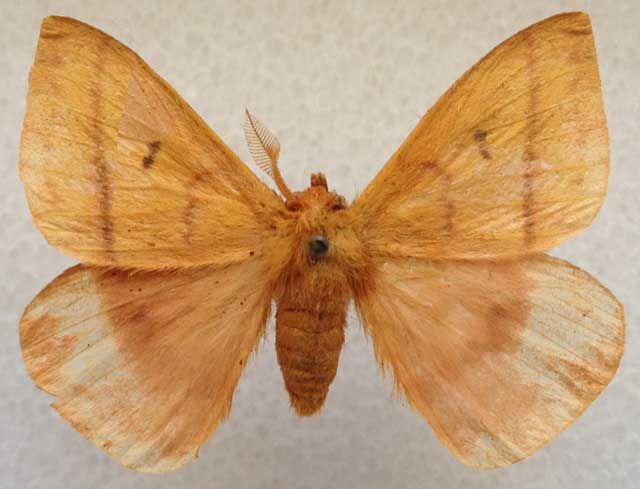
Catacantha latifasciata male, 34mm, Cordisburge, Minas Gerais, Brazil,
November 8, 1919, courtesy of Cornell University Collection, via Ryan Saint Laurent.
As of the end of 2020, there are twelve species in the Catacantha Genus, which can be divided into three subgroups, based on some easily recognized
forewing characters:
Subgroup I: Catacantha latifasciata: the type species and only member of the group with a broadly pre-apical pm line.
Subgroup II: Catacantha stramentalis; C. obliqua; C. ecorientalis; C. jujuyensis; C. nataliae; C. siriae; C. meta; seven members all of which have apical pm lines and
bipartate discal cell markings.
Subgroup III: Catacantha oculata; C. ferruginea; C. bahiginea; C. tabeae; four members all of which have apical lines and pupillated discal cell markings.
Hopefully the following chart will help me and others with identification work. On my home computer I have some images which are only available to me at this point
in time. Hopefully I will receive additional images from members, non-members and other photographers who encounter the missing species. In some cases specimens of
one gender or the other remain undescribed.
Catacantha Genus
Subgroup I: Broadly Apical Fw PM Line |
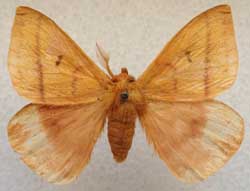
ws: 34mm; fwl: 17-20mm
1000-3000m
|
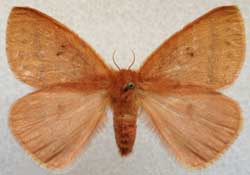
ws: 38mm; fwl: 20-24mm
1000-3000m
|
Brazil:
Mato Grosso do Sul;
Goias;
Minas Gerais;
Parana
Broadly preapical forewing pm line
Bipartate cell markings;
almost uniform honey brown ground colour
|
Subgroup II: Apical Fw PM Line; Bipartate Cell Markings |
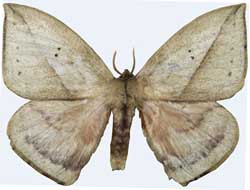
ws: 50mm; fwl: 25-28mm
|
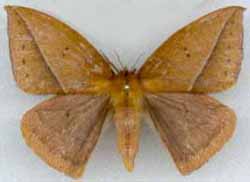
ws: 50-53mm; fwl: 28-30mm
|
Peru:
Madre de Dios;
Cusco;
Junin
Bolivia: La Paz
Relatively large; pml to mid i.m.
Yellowish grey ground colour; darker than siriae
Darker pinkish grey suffusions in hw basal area
|
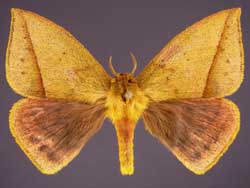
ws: 45mm; fwl: 24-27mm
1370m
|

|
Peru: Cusco;
Junin; Pasco;
Bolivia: Cochabamba.
brighter yellow forewings than strmentalis, which are more greyish yellow to brown.
pml to 1/3 im
|
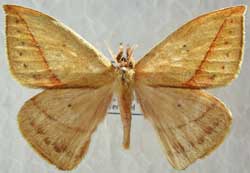
ws: 49-51mm
420m
|

|
Venezuela: Barinas
Aml weak to absent;
right pml slightly s-shaped;
pml to mid im;
|

ws: 48mm; fwl: 24-28mm
530-1670m
|

|
Ecuador:
Napo;
Sucumbios;
Orellana; Pastaza;
Tungurahua;
Zamora Chinchipe.;
markings prominent;
pml to mid im;
pml slightly concave
|
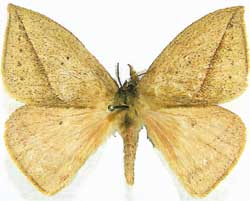
ws: 42mm; fwl: 21-23mm
|
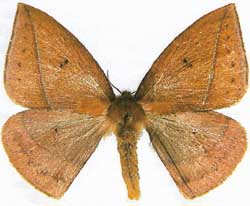
ws: 46m; fwl: 25-27mm;
|
Colombia:
Meta; Cundinamarca; Boyaca;
540-1400m
Relatively small compared to nataliae and ecorientalis; forewing post median line runs from slightly pre-apical to near middle of
the inner margin.
Males with generous greyish speckling on yellow ground colour; very similar to nataliae and ecorientalis
|
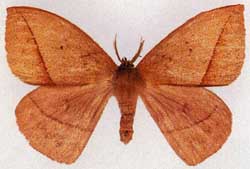
ws: 47mm; fwl: 24mm
900-1000m
|
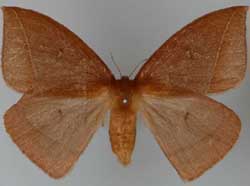
|
Brazil:
Minas Gerais;
Goias;
G.C.: dull yellowish to orangey-grey;
submarginal spots absent or very weak;
hindwing with slight pinkish suffusion in basal area
pml to 1/3 im
|

|

ws: 47mm; fwl: 25mm
|
Argentina: Jujuy
The male is undescribed; the female is very dark, almost black in the forewing basal area;
The cell marking looks like a thin black line rather than bipartate spots; hindwng is reddish grey-brown
|
Subgroup III: Apical Fw PM Line; Pupillated Cell |
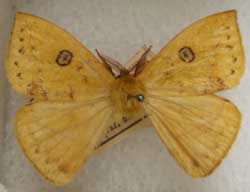
ws: 37-42mm; fwl: 21-22mm
1300m
|
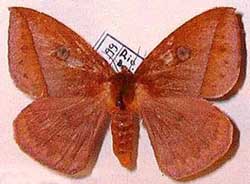
ws: 55mm; fwl: 30mm
1300m
|
Brazil: Minas Gerais;
Rio de Janeiro
Male: yellow with weakly defined, diffuse pm line. Male forewing ocellus very large and prominent
|
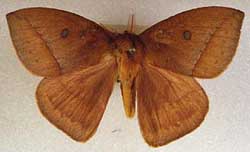
ws: 40-51mm; fwl: 21-26mm
60-1350m
|
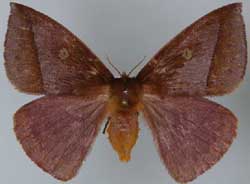
ws: 55mm; fwl: 30mm
60-1350m
|
Brazil:
Rio de Janeiro;
Sao Paulo;
Parana;
Santa Catarina;
Considerably darker than other species
?? Argentina: Misiones
Cell markings and submarginal markings not as prominent as in oculata
|

ws: 49mm; fwl: 25-28mm
150-750m
|

ws: 57mm; fwl: 32-34mm
150-750m
|
Brazil: Bahia;
Pm lines very disctinct and straight on all wings
Submarginal markings quite prominent on the the male
|

ws: 47-50mm; fwl: 25-27mm
700m
|

female undescribed
700m
|
Brazil:
Espirito Santo
forewings: brownish
hindwings: red-brown
fw pml is strongly concave (more so than in very similar ferruginea) with out-turn near inner margin,
|
|
Use your browser "Back" button to return to the previous page.
























